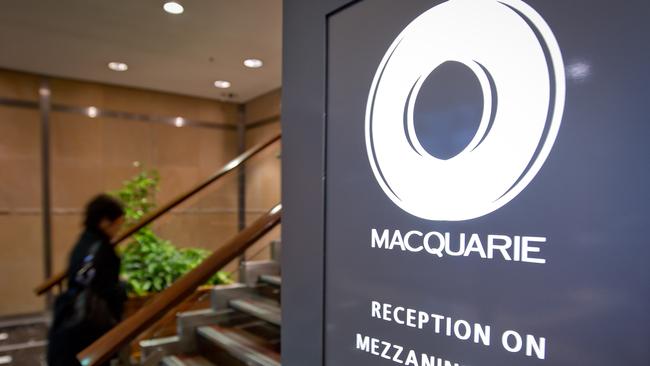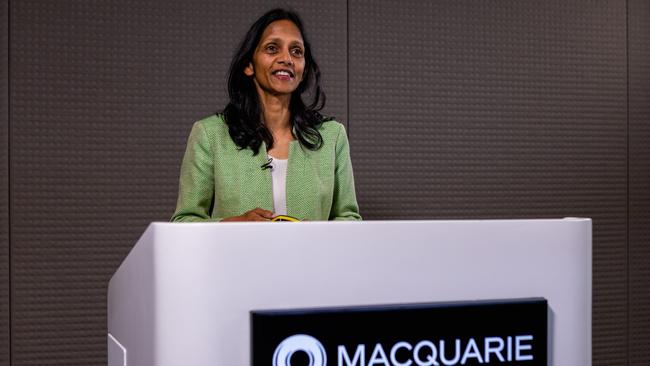
The silver doughnut is poised to deliver a record annual profit, but questions will again be asked about the sustainability of its earnings growth, as global economies slow and central banks continue to fight high levels of inflation.
Macquarie has a habit of not saying too much about the outlook – or giving specific guidance – until much later in its financial year, so investors will be combing any statements or divisional updates for clues. Consensus estimates have Macquarie reporting a net profit of about $5bn for the year ended March 31, surpassing 2022’s record $4.71bn result.
Chief executive Shemara Wikramanayake presents the results on May 5, the same day ANZ hands down its first-half profits.
Macquarie has already flagged that profit in the nine months ended December 31 was slightly up on 2022 levels, buoyed by “exceptionally strong” results across the commodities business.
In February, Wikramanayake said the commodities division would deliver 2023 earnings that would be “substantially up” on last year, subject to market conditions.
Adding to that, the asset management and investment banking giant benefits when the Aussie dollar falls, given 72 per cent of its earnings are now generated offshore.
The Australian dollar has depreciated about 3 per cent so far this calendar year.

Any unexpected asset sales by Macquarie will also be closely monitored, particularly if they are held on the balance sheet rather than its stable of infrastructure funds.
The group’s shares have, though, been swept up in a downdraft related to the aggressive interest rate tightening cycles occurring across major markets.
This time last year Macquarie’s stock was trading above $200, compared to closing at $180.71 on Thursday.
Macquarie’s full-year results coincide with the firm’s annual report and the bumper salaries that earned the place the moniker The Millionaires’ Factory. That won’t be any different this year, given where the profit is set to land.
Investors will also keep an eye out for any regulatory updates or personnel changes that may accompany the results next week, and the firm’s lucrative bonus period. A few rungs down from Wikramanayake’s direct reports, the changes are already occurring.
As revealed by The Australian online on Thursday, Macquarie has announced personnel changes in its equities business.
It has promoted head of research Kristen Edmond to run its local equities division from next week, as she takes the reins from longstanding boss Dan Ritchie. Edmond – who has spent the past few weeks reconnecting with some large trading customers – has had an 18-year stint at Macquarie after joining from Deutsche Bank.
As part of the change, Ritchie moves to chairman of Macquarie Capital Equities. He was also global co-head of equities alongside Adam Zaki, with the latter set to become the sole chief of global equities.
Victor German, who leads Macquarie‘s banking research coverage, takes over as head of equities research locally and will also continue his coverage of the major financial institutions. German joined Macquarie in 2015, after stints at Commonwealth Bank, Nomura and Deutsche.
Macquarie is opting for a similar research model to Morgan Stanley locally, where Richard Wiles heads research and leads banks coverage.
Edmond was talking up Macquarie’s investment plans on Thursday, ahead of the group’s marquee investor conference kicking off on Tuesday. It’s in its 25th year and will see fund managers and corporates come together in Sydney.
“We anticipate there will be some specific areas of growth in the business – with this in mind we continue to invest heavily, with the broadest research coverage on the street including the largest emerging leaders and resources teams in the market,” she said.
“We’ll continue to work closely with our clients, to provide ideas and solutions – often this is the best way to grow profitably.”
As Credit Suisse’s local equities trading desk gets subsumed into that of UBS over coming months, Macquarie and other firms will be seeking to take advantage of the disruption by picking up market share.
NAB delay
Remuneration changes at National Australia Bank’s JBWere – stemming from a new standard known as CPS511 – were set to be communicated to staff this month, but this column understands the briefing now won’t happen until May.
Across the sector, the new standard on remuneration comes into effect from the first bonus cycle after January 1. For NAB that means after it rules off its financial year on September 30.
JBWere currently operates a grid pay model, which, among other things, typically rewards stockbrokers and advisers with a higher share of commission if they write more income for the firm.
In March, NAB’s private banking and JBWere chief Michael Saadie outlined his division had completed a review and would soon be communicating changes to JBWere advisers and stockbrokers.
“There won’t be any changes that are major,” he said in an interview. “There might be minor (changes) in terms of the balanced scorecard but it won’t be where in which grid changes, or payments change or deferrals change dramatically.
“It’s really just getting really clear around the balanced scorecard.”
There were fears the implementation of the new standard could up-end the way JBWere pays financial advisers and stockbrokers given it stipulates there is “material weight to non-financial measures” in pay structures.





Macquarie Group’s 2023 profit results are set to show a purple patch for the firm, as it benefits from factors including a lower Australian dollar and volatile commodity and energy markets.